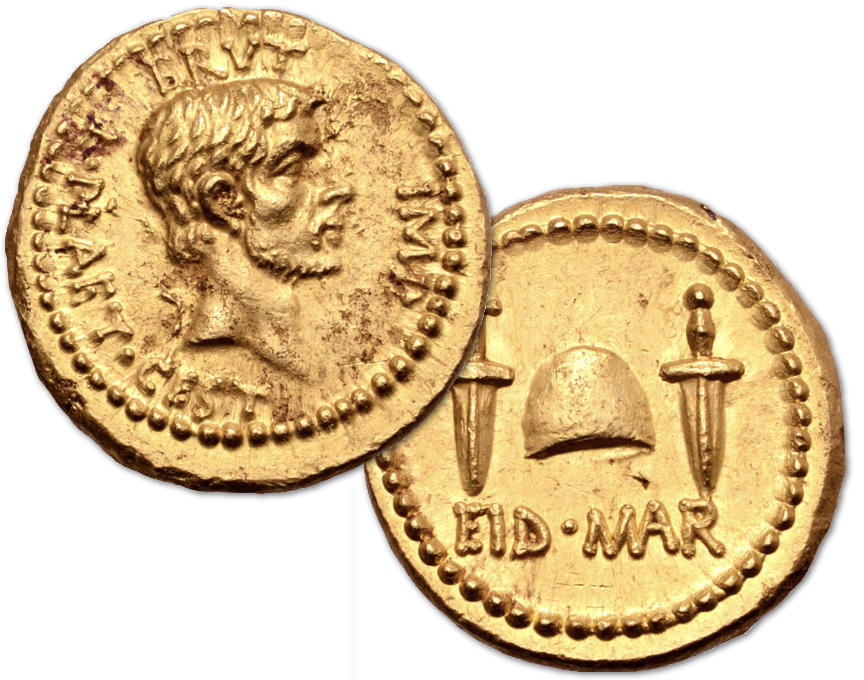Coin Dealer Richard Beale Pleads Guilty
by Björn Schöpe, translated by Maike Meßmann
Richard Beale has pleaded guilty to a number of charges. At a hearing at the New York Supreme Criminal Court on 14 August 2023, the owner of the British auction house Roma Numismatics admitted to committing various crimes as laid out in the indictment, including two counts of conspiracy and three counts of criminal possession of stolen property, according to media reports.
Content
Falsified Provenance of the EID MAR Aureus
From the very beginning, two coins were at the centre of media reports: an EID MAR aureus and a silver tetradrachm from Naxos. Both coins were sold by Roma Numismatics on 29 October 2020 in London. The aureus fetched 3.24 million pounds, the tetradrachm 240,000 pounds. This made the aureus the most expensive ancient coin in the world at the time (until a gold stater set up a new record at a NAC auction in May 2023).
Beale now pleaded guilty to having falsified both provenances. The BBC covered the story and reported based on court documents that Beale had made a deal with the Italian coin dealer Italo Vecchi in 2015. The two men had travelled to Munich and bought the gold coin of unspecified provenance for 450,000 euros there, the BBC explains. In August 2022, Beale sent the aureus to the US to have it authenticated. To avoid any attention of the customs authorities, they allegedly specified the coin’s origin as “Turkey”.
In September 2020, Beale offered both coins at auction and gave the provenance of the collection of Baron Dominique de Chambrier as well as an impressive list of old collections. What had not been known so far is that the baron apparently wrote an email to Beale as early as in October 2020, demanding him to withdraw the wrong provenance. So far, it had only been known that Beale had offered a lot of money for a falsified provenance – apparently to this very baron, who refused the offer. Nevertheless, Beale did not change the provenance and sold the coin at a then record price.
Fake Provenances of Alexander Decadrachms
No less criminal was Beale’s approach to the sale of another group of coins, as BBC News Arabic already reported in 2020. According to the network’s research, fishermen had found numerous ancient silver coins in the waters of Palestine off Gaza in 2017, which became known as the Gaza Hoard. Archaeologist Fadel Alatol, who examined the coins on site, dated them to the 4th century BC and identified some of them as rare Alexander decadrachms. Only twenty specimens had been known of this type before the hoard was found. Shortly afterwards, the coins disappeared. A few months later, nineteen of these Alexander decadrachms appeared at auction, eleven of which in Roma Numismatic sales. The catalogues mentioned “from a private Canadian collection” or “ex-private European collection” as provenances. In September 2017, Roma Numismatics sold such a coin for 100,000 pounds.
In 2019, BBC reporters confronted Beale with their suspicions, telling him that the coins might be from the Gaza Hoard. Beale is said to have provided the BBC with a written statement, clarifying that he knew the consignor well and trusted them. The coins were imported from an “origin country that raised no concern”, Beale explained. Roma Numismatics continued to offer the decadrachms after the incident.
Now, Beale apparently stated in court that he knew that the provenance of the decadrachms had been falsified for the purpose of disguising the fact that they were actually from the Gaza Hoard. Despite the BBC’s investigation, he continued to sell coins from the Gaza Hoard.
Judge Althea Drysdale was quoted by the BBC, calling Richard Beale’s actions “woefully wrong and illegal” as well as “harmful to both the buyers and the nations whose cultural property [was] illegally acquired”. The EID MAR aureus and the Naxos tetradrachm were returned to Greece and Italy at the beginning of 2023.
Beale will have to appear before the New York Supreme Criminal Court in March 2024.








